Plastic Free Laundry Detergent: 11 Eco-Friendly Options

Plastic laundry jugs and plastic bottles are a great burden to the environment as they often carry up to 90% water, are heavy, require a lot of space for transportation, and have, therefore a very high carbon footprint.
Are Laundry Detergent Bottles Recyclable?
Over 30 billion loads of laundry are done in North America each year and over 700 million jugs are discarded every year. These plastic jugs are often made of High-Density Polyethylene HDPE and yes, they are recyclable but their recycling rate according to NAPCOR is around 19.1% only. You can imagine the amount of plastic waste, right?

You may have come across zero waste products before. A “zero-waste lifestyle” is the idea that you can reduce your environmental impact by cutting down on things like plastic and packaging so that you’re not contributing to our planet’s pollution woes. In the world of laundry detergent, this often means making your detergent from scratch or using natural ingredients instead of nasty chemicals.
But that requires a lot of time, what about using a plastic free laundry detergent? Is it possible?
The answer is YES, if you’re referring to the packaging. However, everything gets a bit more complicated if you’re referring also to the product ingredients. There are growing numbers of environmentally conscious brands out there — and we’ll cover different aspects in this article, so that we can shed light about some concepts you might not know yet.
The Rise in Zero Waste Laundry Sheets / Strips
One solution to the heavy and bulky plastic laundry jugs has been the invention of laundry detergent sheets and laundry detergent pods. One sheet, for example, weighs only roughly 3 grams, compared to the roughly 40 grams of a powder detergent load, that’s a 94% lot of saving in weight, which results in saving fuel for transportation and, therefore, 94% saving in CO2. (This data is by the Dizolve Group, the company behind the Tru Earth brand, who is the inventor of the laundry strip technology). We think that it is a great invention and it has a lot of merit for it, particularly as a low carbon solution. However, it has come to our attention after we had compiled this blog post initially that liquidless detergents like laundry strips, some laundry pods, and dishwashing tablets coatings contain a material called PVA.
What is PVA?
The acronym PVA is really confusing as this abbreviation can represent many different types of ingredients. On one hand, it stands for polyvinyl acetate PVA or PVAc, commonly known as PVA glue, wood glue, school or white glue, or even Elmer’s glue etc., and therefore you can imagine that products made with such ingredients cannot be claimed 100% plastic free. The same abreviation though stands also for polyvinyl alcohol PVA and it is also abbreviated as PVOH. This is a synthetic polymer, which is both colorless, odorless, and water-soluble. Pretty confusing, right? According to manufacturers of concentrated laundry strips and dishwasher detergent pods, this material fully biodegrades (1), however, only under specific temperatures, microbes, and other environmental conditions. The same view is shared in a study by the Association for Soaps, Detergents and Maintenance Products (2), although more independent research on this topic is needed.
How does PVA / PVOH Impact the Environment?
A recent study published in the International Journal of Environmental Research and Public Health titled: “Degradation of Polyvinyl Alcohol in US Wastewater Treatment Plants and Subsequent Nationwide Emission Estimate” (3) by two Arizona State University Researchers shows that while the material dissolves in water, it doesn’t biodegrade during wastewater treatment and stays in the environment, though under a different matrix, and it is, therefore, a threat to the eco-system. By putting this information together, some researchers have projected how much PVA goes untreated and is released into the environment in the USA alone and this is estimated to be as much as 75% of PVA. That amounts to about 8,000 tons of the plastic material being released annually onto land and into waterways across the country (4).
As far as we know though, this is the only study we are aware of about this material in wastewater treatment plants. Also, to be fully transparent, this research was funded in part by sustainable cleaning products manufacturer Blueland.
Does PVA Biodegrade in Marine Water?
A study published in October 2021 in the Journal Polymers (5) assessed the toxicity and biodegradability of polyvinyl alcohol (PVA) based materials in marine water and supported the lack of biodegradability of PVA materials under conditions representative of a natural marine environment. It also urged the development of standards to better assess biodegradation under realistic marine end-of-life scenarios.
Another study published in the Royal Society Open Science Journal in February 2019 (6) reported the deepest record of microplastic ingestion, in the Mariana Trench, by deep sea creatures, and unfortunayely included also polyvinyl alcohol (PVA).
We know that for some the perceived benefits often outweigh the potential environmental concerns, particularly those related to climate change, as the carbon footprint of laundry sheets is minimal compared to conventional laundry detergents that also include many toxic chemicals, therefore we decided to also list products that contain this ingredient, and highlight this ingredient, to be fully transparent towards the readers.
In our opinion plastic-free laundry detergent sheets do not exist and our recommendation is to choose a product from the list that is zero-waste and doesn’t have any polyvinyl alcohol in it for your peace of mind!
Are Traditional Laundry Detergents Toxic?
On the other hand, traditional liquid laundry detergents are one of the most toxic cleaners in your laundry cabinet, because we use it so often and on so many items. They include engineered chemicals called optical brighteners (OBs), which are fluorescent dyes that are added in tiny quantities to most laundry products. Why? The reason is that they are fluorescent under UV light, and therefore, they make whites and colours look brighter. Not enough research is available to identify if these are harmful to humans and wildlife, however one thing is sure: they are not biodegradable. (Watch the video below to learn more).
Other controversial chemical are silicones which are used as an antifoaming agent in laundry detergents and fabric softeners, (and also in cosmetics) and to make your fabric softer. These have been found to be persistent, bio-accumulative and toxic in the environment (7).
All these chemicals are residual, which means, they leave a film on your clothes, sheets, pillowcases, and towels which stay on the fabrics. As you see, there is no perfect solution, it’s about choosing products that might not be 100% perfect but are safer for you and the environment.
I know many readers use America’s #1 detergent brand based on sales, Tide laundry detergent, which also comes in a powder version with cardboard packaging, therefore with “plastic-free” packaging (apart from that pesky plastic scoop), however, have you looked at the list of ingredients for this product???
10 Best Zero-Waste Laundry Detergent Brands that are PVA-Free
Ready to switch to plastic free laundry detergent brands? Here are some sustainable laundry detergent brands you can use to shine your clothes. Remember: All of the options listed below, while they might not be perfect or 100% plastic-free, are much better than most of the ones you’ll find on the supermarket shelf, also considering the nasty chemicals that those products contain.
This post contains affiliate links, which means we may receive a small commission, at no cost to you, if you make a purchase through a link. This helps us continue the hard work we put into researching products and solutions.
Please Note: Our health content is for informational purposes only and is not intended as professional medical advice. Consult a medical professional on questions about your health. Please read our disclaimer. Please read our disclaimer.
While we make our best efforts to scout plastic-free products around the world, we are also aware that it’s not always possible to find products that are 100% plastic-free, also in their ingredients. In this article, we are presenting the best versions of what is available on the market according to our values, and we are fully transparent regarding the PVA / PVOH ingredient.
1. Blueland PVA-Free Laundry Tablets – USA – Canada
This is one of our favorite plastic-free laundry detergents. Why? Because it doesn’t contain PVA/ PVOH, it comes in compostable packaging and it’s still in a convenient solid form. Laundry detergent is the last thing you want to create a mess with. After all, it’s supposed to clean your clothes—not create an environmental problem. Blueland Laundry Tablets are packaged in a dry, concentrated tablet form and contain no plastic packaging. They are free from toxic ingredients like fragrances, parabens, and artificial dyes, plus they are certified vegan by the Leaping Bunny program. The tablets are shipped in compostable packaging and come with a refillable tin-coated steel container that can be used for storing at home or on the go! The PVA-free tablets, themselves, are completely plastic-free. The manufacturer states that they are the first and only plastic-free laundry tablet on the market in a convenient single-use format that isn’t wrapped in a plastic film and is therefore PVA/PVOH free. Last but not least, they are climate-neutral and B-Corp certified. We tried these tablets and we were surprised to see that despite their size they work well! They are very concentrated and you only need 1 tablet for a small load and 2 tablets for a very large load. See our image below.
Tip: if your table doesn’t fully dissolve in the detergent compartment of your washing machine, place it directly inside with the load!
Manufacturing country: USA
Loads per packaging: 60
PVA/ PVOH: no.
Scent: Fragrance-Free
Packaging: compostable refill packaging and reusable, refillable stainless steel tins.
Delivery:
-
- From Blueland directly
- Amazon USA – Canada
Image: I’m Plastic Free Founder Simona holding the Blueland plastic free laundry tablets.
2) Nellie’s All Natural Baby Powder Laundry Detergent in a Tin – USA – Canada

This is our second favorite truly sustainable detergent as it’s all-natural and it has been created with the utmost care for sensitive baby skin. Nellie is not just a brand! She was a real person with real values. She believed in honesty and simplicity, and she was going green long before the color was cool. The hypoallergenic laundry formula made in Canada has been infused with an oxygen brightener and is designed to deliver natural radiance and stain removals without the need for additional whiteners. This concentrated laundry detergent doesn’t contain water, which makes up most of the liquid detergents. At Nellie’s, they don’t think that selling and moving water around the planet is a very good idea, as this has a higher carbon footprint. Instead, more cleaning power can be packed into a smaller space using powder. As the tin is reusable and recyclable it makes this product a zero plastic laundry detergent. Use one tablespoon of laundry powder per wash.
Manufacturing country: Canada
Loads per packaging: 80
PVA/ PVOH: no.
Scent: Fragrance-free.
Packaging: recyclable tin
Delivery:
Related: 9 Best Plastic-free Fabric Softeners?
3. HexaWash All-Natural Laundry Detergent Alternative – Plastic-free! – USA & Worldwide
The Hexawash eco friendly laundry detergent substitute was developed during lockdown 2020 – a proof that some good things have emerged from these very testing times! It uses magnesium, not harsh chemicals to clean clothes and it does this as well as your normal laundry detergent, if not better. It lasts for an incredible 300 washes, making it hugely economical, when the price is broken down per each load!
Each Hexawash contains an organic cotton pouch filled with magnesium pellets — and absolutely zero synthetic chemicals, therefore it’s made from fully biodegradable materials, it’s plastic-free and ideal for those seeking a truly zero waste laundry detergent. How does it work, you may think? When mixed with water, these little magnesium balls react to form hydrogen gas (H₂) and magnesium hydroxide (Mg(OH)₂) and to generate an alkaline solution of pH 10.5 in your washing machine — the ideal pH for washing clothes. The manufacturer states that it’s safe to use in all washing machines, including top-loaders, front-loaders, as well as high-efficiency (HE) washing machines.
Tip: use it as well as a laundry booster to soak smelly gym gear, or badly soiled clothes before the machine washing. We tried it and tested it and it does work! See our YouTube Short below.
Manufacturing country: ethically handmade in the mountains of Chiang Mai, Thailand, by a local team of dedicated seamstresses.
Loads per packaging: 300
PVA/ PVOH: no.
Scent: Fragrance-free.
Packaging: this detergent is packaged in a compostable cotton pouch and recyclable, compostable cardboard box.
End of life: when your Hexawash weighs less than 80g, simply bury it in your garden. The organic cotton will biodegrade, while the magnesium will fertilize the soil, helping your garden to flourish.
Delivery:
- Amazon USA
- From SuperBee directly
Video credit: I’m Plastic Free Testing the HexaWash
4. Meliora Eco Laundry Powder – USA – Canada
Meliora offers concentrated plastic-free laundry powders manufactured locally in Chicago, US. They come in a reusable steel container that you can refill with all-paper and cardboard refill boxes. And the best part? They’re made of only a few ingredients that septic-safe and great for use around kids and pets! Best of all, none of the ingredients are tested on animals (they are certified cruelty-free by the Leaping Bunny program), so you can rest easy knowing that this product is safe for your family.
You can also buy large zero-waste buckets that allow you to have 2,320 HE loads of laundry (or 18 refill laundry boxes). You keep the box the bucket comes in and send the empty bucket back with the included pre-paid return shipping label back to the factory.
We tested this product, as you can see from the images, and were fully satistifed with their cleaning power!
Manufacturing country: USA, IL, Chicago
Loads per packaging: 128 HE loads, 64 standard loads
PVA/ PVOH: no.
Scent: Unscented, Lavender, Lemon, or Lemon, Lavender, and Clove
Packaging: The laundry detergent is packaged in a refillable steel container, refill pouches are packaged in a paper bag and a cardboard box to protect the bag from breaking.
Delivery:
-
- Amazon USA – Canada
- Meliora – use code IMPLASTICFREE10 for a 10% discount at checkout
- HearthHero USA
Image credit: Simona Paganetto / I’m Plastic Free testing the Meliora Cleaning Products Laundry Powder.
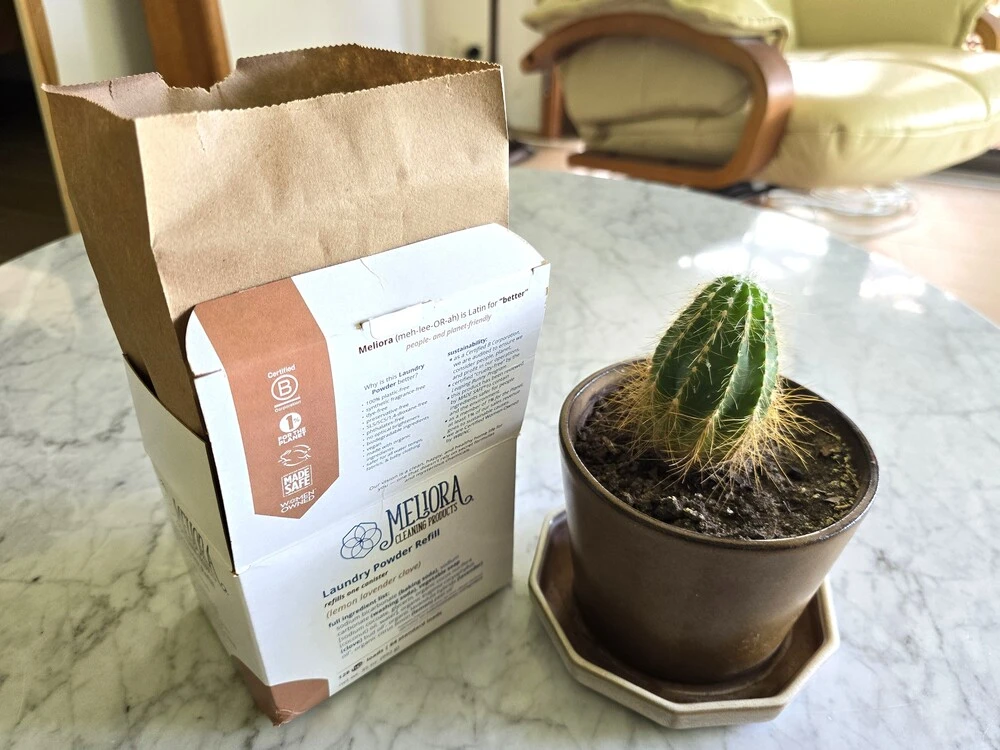
Image credit: Simona Paganetto / I’m Plastic Free testing the Meliora Cleaning Products Laundry Powder Refill.
5. Dirty Labs Bio Enzyme Laundry Liquid – USA / Canada
Dirty Labs Bio Enzyme Liquid Laundry Detergent is a hyper-concentrated, nontoxic, and biodegradable formula made with USDA certified 97% biobased ingredients for effective stain and odor removal while being gentle on fabrics and the environment. The product is free from sulfates, dyes, SLS/ SLES, parabens, chlorine bleach, and Prop 65 chemicals.
Manufacturing country: USA
Loads per packaging: 32, or 80 with the refill bottle, compatible with high-efficiency and standard washing machines.
PVA/ PVOH: no.
Scent: Magnolia, Bergamot, and Cedar.
Packaging: Reusable and infinetly recyclable aluminum bottle with concentrated formula that reduces packaging and carbon footprint.
Delivery:
Related: Are you an Environmentalist? You’ll Love These 7 Plastic Free Dish Soap Brands
6. etee Super Concentrated Laundry Detergent – USA / Canada
etee has created this super concentrated powder, with biodegradable, sceptic safe, high performance ingredients tough on stains but without PVA / PVOH dissolvable plastic, suphates, parebens, and other harsh chemicals. The formula is so concentrated that you only need one teaspoon for lighter loads, and 1 tablespoon for heavier loads. 1 tablespoon of their detergent weighs about 12g, vs. a typical liquid pod, which weighs on average 23g. This means less weight and a lower carbon footprint.
Manufacturing country: Canada
Loads per packaging: 180, compatible with all washing machines.
PVA/ PVOH: no.
Scent: Unscented.
Packaging: The manufacturer states that it is a paper bag with a 100% biodegradable lining – including the ‘zip’ closure.
Delivery:
-
- From etee
- From Amazon USA
7. Zero Waste Laundry Concentrate by Tangie for a Refillable Laundry Liquid – USA
Tangie is a woman-run American business based in Florida. Their eco-friendly, vegan detergent is very easy to use! Simply add the paste to a gallon of tap water and let it dissolve. No hot water, no stirring or mixing is required. It makes a gallon of liquid laundry detergent. If you have a smaller container, just cut the bar into small pieces to make the amount of liquid you need. Use one ounce of liquid per load. That is less than $0.20 per load!
Manufacturing country: USA
Loads per packaging: 128-264, depending on load size and dirtiness level.
PVA/ PVOH: no.
Scent: Unscented.
Packaging: Cardboard box.
Delivery:
Related: Plastic-free Toilet Paper: 13 Eco-friendly Options
8. NaturOli Soap Nuts Organic Laundry Detergent – USA – Canada
NaturOli Soap Berries are made from saponin. This organic laundry detergent is a natural cleansing agent and fabric softener found in soap berries from trees that grow in the Himalayas. These products are free of chemicals or additives harming your and your family’s skin. They’re great for sensitive skin but leave clothes fresh and clean. It’s like pods — you put four to five in a bag and toss the whole thing into the washing machine.
NaturOli is the largest developer of soap nut products across the USA, and they fully stand behind the wholesome benefits of saponin extract from their Certified Organic soap nuts, as demonstrated by the great customers’ reviews.
Manufacturing country: Himalayas. These products are not a Chinese import. They are inspected, sorted, and packaged in the USA.
Loads per packaging: 1-Lbs (240 loads)
PVA/ PVOH: no.
Scent: Fragrance-Free
Packaging: compostable and reusable muslin/cotton drawstring storage tote, plastic free packaging
Delivery:
-
- Amazon USA – Canada –
Related: 9 Plastic-free Soap Dispensers for Eco-conscious Individuals
9. Biome Unscented Laundry Liquid Concentrate Bar – Australia
Biome has newly launched an amazing laundry liquid concentrate that makes 4 liters of liquid detergent! Unlike laundry sheets and most liquids, their bar is 100% guaranteed no palm oil, it has no irritating synthetic fragrances, nor any sneaky petrochemicals. Just biodegradable and septic safe ingredients.
It’s an economical way to have a truly sustainable laundry!
Manufacturing country: Australia
Loads per packaging: 60+
PVA/ PVOH: no.
Price per load: from AU $0.42
Scent: Unscented
Packaging: plastic-free cardboard box, or you can chose no box for your second order. As you’re not paying for water, it saves space in your laundry cabinet and plastic waste.
Delivery:
-
- From Biome Australia
Related: Homemade Plastic-free Cleaning Spray
10. Resparkle Natural Laundry Powder – Australia

Resparkle has created a clean laundry detergent that uses plant-based palm-oil free ingredients and revolutionary biotechnology to clean clothes, remove tough stains and erase odours. The powder is so concentrated that you only need two heap teaspoons to one full (top and front) load, making it an affordable alternative to supermarket detergent brands. This sustainable laundry detergent is free from nasties, it has no synthetic fragrances or artificial color brighteners, it kills 99% of germs naturally and cleans even your washing machine, preventing mould build up!
Manufacturing country: Australia
Loads per packaging: 220 (Bulk buy: 4 x 600g bags)
PVA/ PVOH: no.
Price per load: from $0.49
Scent: Australian lemon eucalyptus oil, or fragrance free.
Packaging: Home compostable pouch
Delivery:
Not PVA-Free Laundry Detergent
11. Tru Earth Laundry Strips – USA / Canada / Australia
We added this option, in case after reading our article, you still want to opt for laundry sheets. Tru Earth Eco-Strips are eco-friendly laundry detergent strips that provide a concentrated dose of cleaning power in a tiny, pre-measured strip. Tru Earth Eco-Strips are made from plant-based ingredients. You can simply toss them into the laundry machine together with your clothes. No measuring is necessary. This product is made in Canada and does not use any animal-based ingredients or test on animals. True Earth Eco-Strips are hypoallergenic, paraben-free, phosphate-free, chlorine bleach-free, and free of 1,4-dioxane with no added dyes. They are also certified by independent dermatologists.
Manufacturing country: Canada
Loads per packaging: 32, 64, 384
PVA/ PVOH: yes.
Scent: Lilac Breeze, Fragrance-Free, Fresh Linen.
Packaging: recyclable cardboard box
Delivery:
3 Tips for a Non-Toxic Laundry
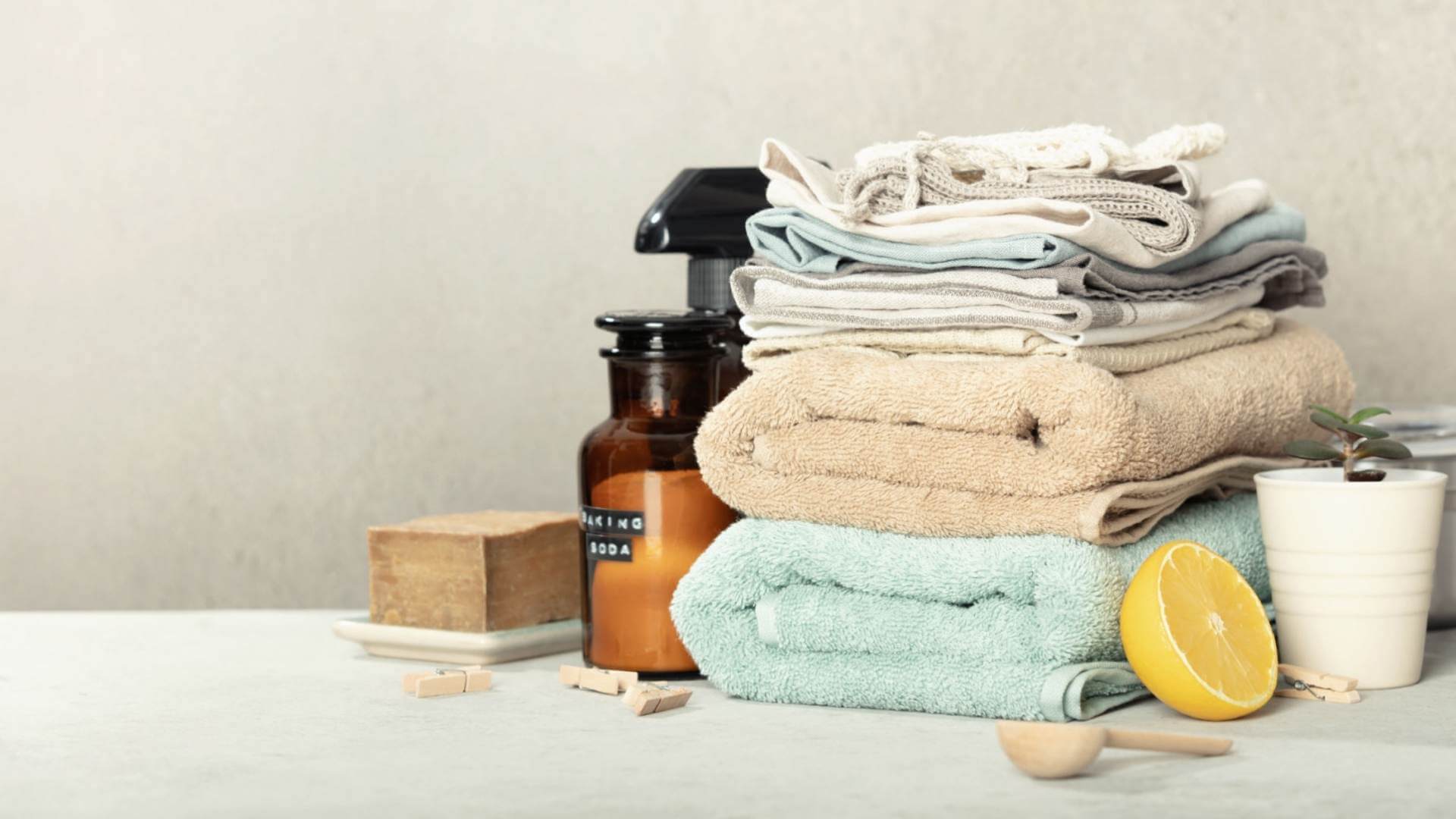
Tip 1: Replace Fabric Softener with White Vinegar
That’s right if you want to avoid buying expensive eco-friendly fabric softeners then simply buy white vinegar in bulk and add a splash in your washing machine compartment for the rinse cycle.
Tip 2: Use a Zero Waste Stain Remover on Wet Stains
Use a plastic free stain remover laundry stick to rub those stubborn stains, and make sure they are gone after doing your laundry! No need for toxic cleaning products.
Tip 3: Buy Baking Soda in Bulk and Use it with Your Detergent
Another tip to save money and improve the cleaning power of the detergent you’ve chosen is to buy baking soda (pure sodium bicarbonate powder) in bulk and add 1/2 a cup to your machine machine. Baking soda is in every non-toxic laundry and helps regulate PH levels in the water, helps remove odors, brighten whites, and soften fabrics. I learnt this trick from my mother-in-law!
Final Thoughts for a Sustainable Laundry
Are you ready to make the switch to a plastic free laundry detergent now? Or are you more adept at sticking with your favorite brand of laundry detergent? There are many ways to reduce your plastic footprint and live a cleaner, more sustainable lifestyle with low waste. Simply switch from an ordinary way to do laundryto choosing a low carbon and possibly completely plastic-free alternative. We have provided a list of the best eco-friendly laundry detergents but other environmentally friendly laundry accessories can replace or complement sheets or powdered laundry, like laundry soaps in the form of laundry bars and stain removals. You need not spend extra money in case you want to do your homemade laundry detergent products — they’re often made from common ingredients in your kitchen! So go ahead, find one that works for you!
All these products, will make reaching your plastic free cleaning goals easiliy!
References and Scientific Literature Sources:
(1) https://www.sciencedirect.com/science/article/abs/pii/S0079670002001491?via%3Dihub
(2) https://www.degruyter.com/document/doi/10.1515/tsd-2020-2326/html
(3) https://www.mdpi.com/1660-4601/18/11/6027
(4) https://www.eurekalert.org/news-releases/923669
(5) https://pmc.ncbi.nlm.nih.gov/articles/PMC8588384/
(6) https://pubmed.ncbi.nlm.nih.gov/30891254/
(7) https://cosmethicallyactive.com/silicones-in-cosmetics-and-their-impact-on-the-environment/
—
Browse our directory to find more eco friendly laundry detergent brands in your country.
Comments
Ahmed
November 5, 2023 at 11:03 amGreat article, I’m reading it because I’m obliged as a muslim to use detergents that are 1)Alcohol free (in this case PVA free) and 2) doesn’t contain any animal products (vegan) or contain animal products that are derived from permissible animals that are slaughtered according to Islamic terms
So I’m ordering 2 products found in this article from Amazon USA, thanks to God(Allah) and then to you for make me benefit from this article
Andrew
January 15, 2024 at 10:05 pmTHANK YOU for all this research! I know a lot of time and effort goes into it, and it’s a blessing for all of us. I’m already using one of these (Kind Laundry), so when I order again or decide to move to another recommendation, I’ll be sure to click through your link to throw a little affiliate commission your way. And I sent a message to Kind to urge them to reformulate without PVA. It’s also a little bothersome that they’re manufactured in China where assurances of eco standards seems questionable.
Sage
February 26, 2024 at 5:51 amThank you for the research you did on all this.
I’m a scientist who embraced environmental sustainability since the 1990s. I acknowledge that science can be used for the wrong reasons, ignored to turn a profit, or used to manipulate environmentally-conscious people. It is common for some scientific industries to place ethics below profit. And I also know the power of understanding the scientific literature to help wade through all this misinformation. And it takes a lot of time and I am supportive of people trying to make sense of all this. And, I am wondering if you reviewed this original German (?) scientific article by DeGruyter published in 2021: https://www.degruyter.com/document/doi/10.1515/tsd-2020-2326/html?lang=en#j_tsd-2020-2326_ref_004_w2aab3b7c95b1b6b1ab2ab4Aa -on specifically the biodegradability of PVOH in laundry capsules. I include some of their points below, but it’s best to read the article.
I’m a chemist, now a teacher, and in my research, I found a few things that people need to be careful of:
1) Be sure you are reading articles on polyvinyl alcohol, and not on polyvinyl acetate. Unfortunately, the internet is using PVA for both and this makes finding the applicable articles more difficult. A better abbreviation is PVAc =polyvinyl acetate and PVOH =polyvinyl alcohol.
2) Wine, beer, and spirits contain an alcohol called ethanol. It is not a polymer. It is a completely different substance with different properties than PVOH. People wanting to avoid “drinking” alcohol for reasons of abstinence, religious or health-wise, need to avoid the ingredient “ethanol” also known as “ethyl alcohol”. The term “alcohol” is a generic name. Other alcohols you may have heard of include isopropanol/isopropyl alcohol as a disinfectant for first aid; and methanol/methyl alcohol used industrially (and mixed into industrial ethanol to keep people from drinking it since it is poisonous).
3) To make it more confusing, unfortunately, there are different types of plastics, and thus microplastics. But again, this is because plastic is a very generalized term, as is the term “polymer”.
4) There are two ways that plastics “disappear” or can no longer be seen with the naked eye. (A) First, PHYSICAL degradation: It can physically become smaller and still be a solid, microscopically small, and still be present as the original material, and still accumulate and create problems en masse in environmental systems and human bodies. This is just physically degrading -just becoming smaller and smaller but remaining the same material, and remaining in our environment forever! (B) Secondly, CHEMICAL degradation: It decomposes into different chemicals, preferably saver chemicals. The PVOH IN LAUNDRY PODS (as specific microfilms that are made in a specific manner) break down into smaller components that microorganisms use as food (now it’s undergoing biodegradation, as in it is “biodegradable.”). And then the microorganisms release it as their waste (i.e., poop) and now the PVOH no longer exists, and thus THIS TYPE OF PVOH did not become a microplastic.
5) There are different types of PVOH depending on how it was manufactured. Unlike the PVOH used in laundry pods, other types of PVOH will stick around longer. FOR CHEMISTRY FOLKS: For example, chemical differences having to do with how long the polymer chains are, how many hydroxyl groups it has, and whether those hydroxy groups interact with water or with other hydroxyl groups on the chain which affects its solubility in cold or hot water -basically, are the intermolecular interactions greater than the intramolecular ones.
Do I use pods? I’m still trying out the other options, too. Still testing and asking questions. I will look at some of the mentioned brands.
I hope this is helpful to all in some way or another.
Richard Bauer
March 1, 2024 at 5:53 amIf you are trying to minimize your use of plastic beware of ordering these products from Amazon. I ordered some sheets from Amazon and, although the product packaging was cardboard, Amazon shipped it inside an Amazon bubble-wrap plastic envelope. Talk about unclear on the concept! It would be nice if more of these products were available on local store shelves.
LJ
March 5, 2024 at 5:28 amThis is really great information but I’d love to hear your thoughts on products available in the UK!
Rosemary Tomlinson-Morris
March 24, 2024 at 3:12 amI’ve tried Tru Earth and Freddie’s. Next will be your top of the list Blueland. The tin cans are unnecessary.
allie
April 1, 2024 at 5:18 amThank you for the helpful breakdown. Do you have reservations about Nellie’s Laundry Soda or did you just decide to pick the one of their products that’s most eco-friendly? And I’m disappointed to see that they’re making plastic wrapped dishwasher pods.
Karyme Orozco
May 24, 2024 at 4:12 amHello,
Thank you for such an informative article. I have a question though, what are your thoughts on Zote, or Roma soap. My mom uses the bag from the roma soap as a trash bag and it comes in a powder form so she says it’s fine but I’m not sure. The Zote soap she doesn’t use as much but she want to support Mexican brands so she thought that could be an alternative.
Thank you!
Tracy
August 4, 2024 at 12:49 amHow do you feel liquid Castile soap rate for use as laundry++ detergent? At least now it can be purchased in cardboard cartons or refillable glass jugs.
Kim
September 21, 2024 at 11:30 amIn regards to EcoRoots, they are manufactured in the USA in small batches (according to their website).
Jane
December 16, 2024 at 2:38 amWhile the information on whether a product contains PVA is very helpful, it IS plastic. If a product contains PVA, it is not plastic free. Calling this a list of plastic free options is a bit misleading.
Deborah
January 28, 2025 at 2:13 amThank you for this article. I was pleased to see 2 products from Canada but disappointed that the Tru Earth and other laundry sheets contain PVA/PVOH. I am finding that these sheets are not dissolving completely and now have to tear them in shreds to not get spots of goo (like snail slime) or white residue once dry.
Other consideration is transport and thus Carbon footprint. Obviously, buying a product made in China or even the US (from Canada) adds to that.


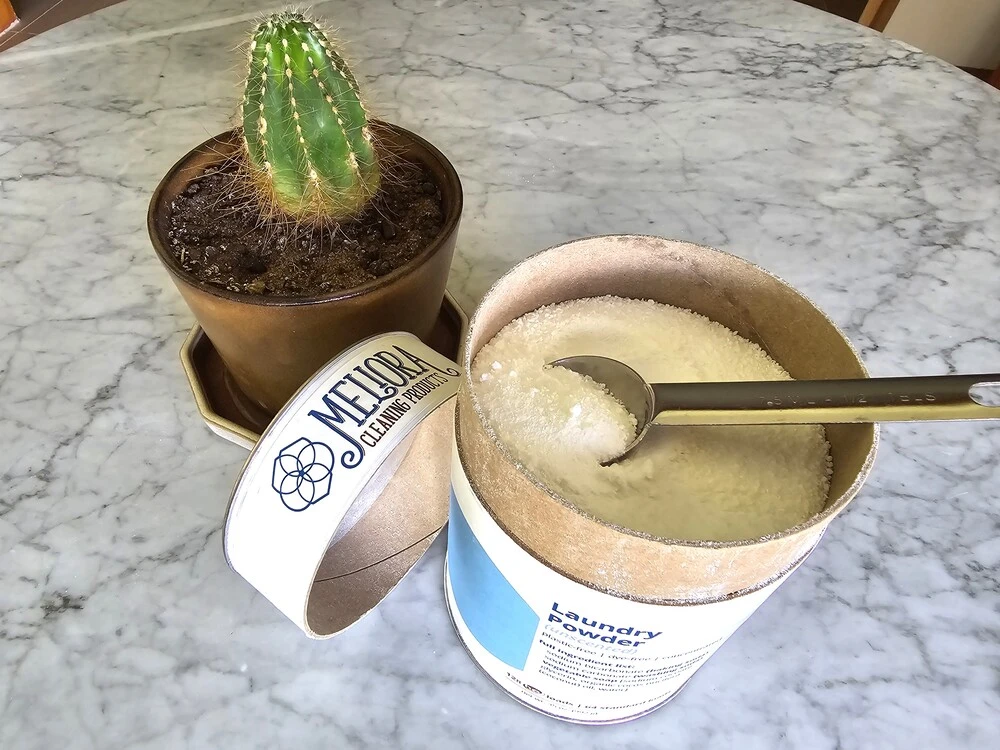
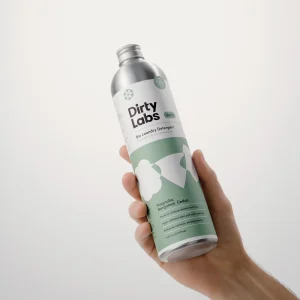



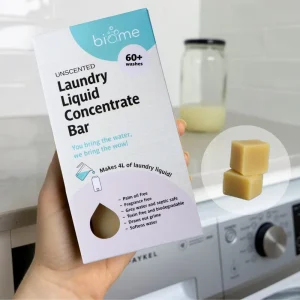



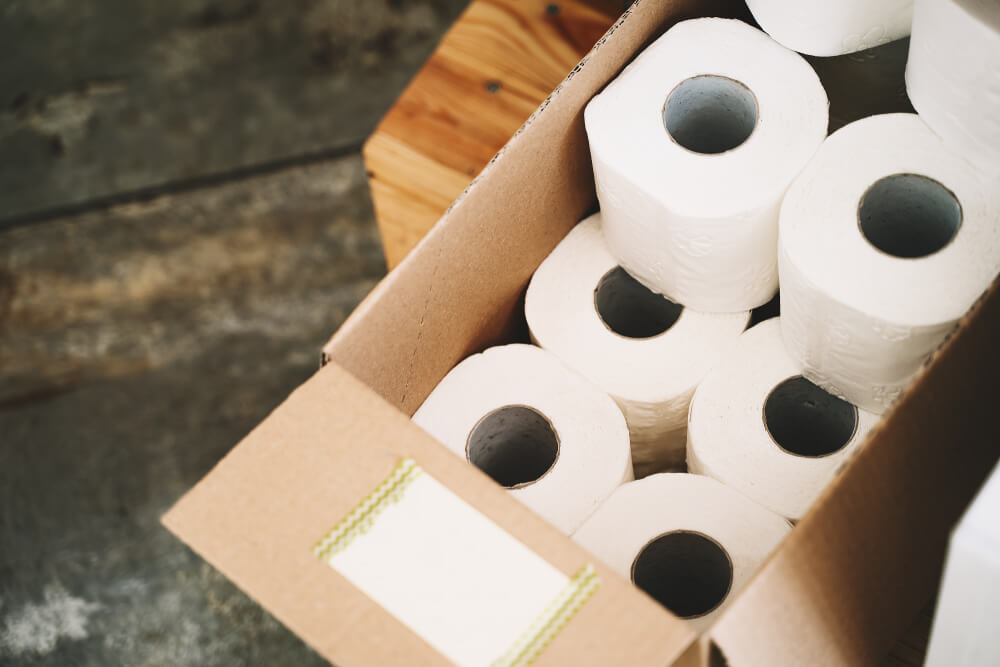
N. L.
October 8, 2023 at 11:33 amCalling out the PVA info for each brand was super helpful! I ended up purchasing from the smaller Symbiotic Products today and plan to purchase from Blueland in November. Thank you!
I'm Plastic Free
October 9, 2023 at 6:09 pmThank you so much for your great feedback! It’s great to hear it was helpful. We place a lot of time and effort in doing the research & writing these articles. If you purchase through our link, we receive a small commission that help us continue our work (for which we are very passionate about).
Thanks again
Simona